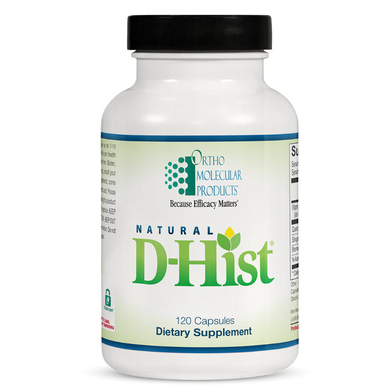Ortho Molecular Product Natural D-Hist – Targeted Seasonal Support for Sinus & Respiratory Health
Ortho Molecular Product Natural D-Hist is a professional-grade supplement designed to provide powerful seasonal support. This advanced formula helps maintain immune balance in hypersensitive individuals and supports clear nasal passages, normal mucus viscosity, and optimal sinus and respiratory function.
By blending potent botanical ingredients with antioxidants and enzyme support, Natural D-Hist promotes healthy histamine levels while minimizing side effects commonly found in traditional seasonal relief options.
Natural D Hist Benefits
- Supports immune balance in hypersensitive individuals
- Encourages healthy sinus and respiratory function
- Promotes normal viscosity of mucus
- Helps maintain clear nasal passages
- Non-drowsy, natural seasonal support
How Natural D Hist Works
Natural D-Hist works through a synergistic combination of clinically researched ingredients that target multiple pathways:
- Quercetin – A flavonoid with antioxidant properties that helps stabilize mast cells to regulate histamine release.
- Stinging Nettles Leaf – Traditionally used for upper respiratory support, this herb offers fast-acting relief for sinus and nasal health.
- Bromelain – An enzyme derived from pineapple that enhances absorption and supports mucosal tissue health.
- N-Acetyl-L-Cysteine (NAC) – Promotes healthy mucus viscosity and helps detoxify environmental stressors.
- Vitamin C – A powerful antioxidant that supports overall immune function.
This formula is designed for safe daily use and does not contain common allergens or artificial additives.
Natural D Hist Is Formulated For
Natural D-Hist is ideal for individuals who:
- Suffer from seasonal allergies or environmental sensitivities
- Seek natural alternatives for sinus and respiratory support
- Desire a non-drowsy, non-habit-forming formula
- Want a safe and gentle option that supports immune balance
- Value a product that supports joint, bone, and skin health through reduced inflammation
Supplements support your health but do not replace a balanced diet. Always check with your healthcare practitioner if you have doubts about a new supplement. Or, you may book a FREE product consultation at Holistic Health Partners. You may want to look at our other Immune Support products!
Free From: Wheat, gluten, soy, dairy, animal products, shellfish, peanuts, tree nuts, egg, artificial colors, sweeteners, preservatives.
Caution: If you are pregnant or nursing, consult your physician before use.
These statements have not been evaluated by the FDA. This product is not intended to diagnose, treat, cure, or prevent any disease.



